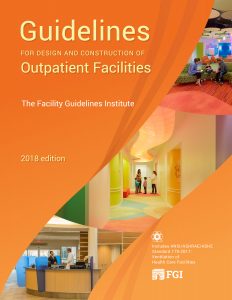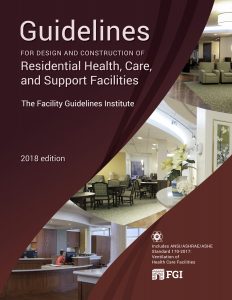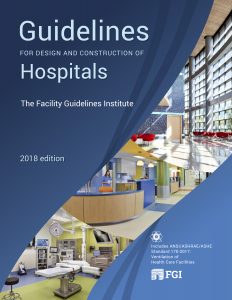All about Guidelines!
By Jane Rohde
Introduction
This month, Sunbrella is bringing to you; All about Guidelines! There are some exciting new resources being completed by the Facility Guidelines Institute that have been introduced in 2018.
What is the Facility Guidelines Institute?
The Facility Guidelines Institute, commonly referred to as the FGI, is an independent, nonprofit organization dedicated to developing guidance for the planning, design, and construction of hospitals, outpatient facilities, and residential health, care, and support facilities. The FGI oversees the revision process and publication of guidelines, funds research, and offers resources that support the development of safe, effective health and residential care built environments.
What is the Health Guidelines Revision Committee?
The Health Guidelines Revision Committee, referred to as the HGRC, is the guidelines revision multidisciplinary consensus body of the FGI that includes all types of expertise as it relates to hospitals, outpatient facilities, and residential health, care, and support facilities. Expertise includes design professionals, clinical and care providers, authorities having jurisdiction, researchers, and specific experts in specialties; including but not limited to gerontology, critical care, acoustics, lighting, telemedicine, and IT. Further HGRC liaisons partner with ANSI/ASHE/ASHRAE Standard 170 Ventilation of Health Care Facilities committee members to promote a seamless connection between the Guidelines and the Standard content for Hospitals and Outpatient settings.
For the 2018 revision cycle, there were three document groups of experts assembled, focusing on hospitals, outpatient facilities, and residential health, care and support facilities specifically of note is the brand-new book, Guidelines for Design and Construction of Outpatient Facilities. The trends indicate, despite potential changes to Obamacare by the current administration, that care services will predominantly be occurring in outpatient settings or within the home. In 2014, a separate book was developed for residential settings entitled Guidelines for Design and Construction of Residential Health, Care, and Support Facilities, which has been updated in the 2018 cycle to include two new chapters; one for residential settings for residents with developmental and/or intellectual disabilities and the other for residential substance abuse treatment settings. The hospital of the future is trending toward providing intensive and critical care services and has been coordinated closely with the new outpatient book to evaluate common types of spaces that impact both types of settings. The Guidelines for Design and Construction of Hospitals rounds out the set of books for the 2018 cycle publication.



Who Uses the Guidelines and Who Adopts the Guidelines?
The Guidelines are used by designers, providers, and regulators (commonly called authorities having jurisdiction). The Guidelines are adopted in 42 states in some form. Some states adopt the entire document or only a portion of one of the documents. In some states, as the new edition is published, the state licensing code automatically updates to the new edition. The Hospital Part (and subsequently the 2018 separate Hospital Guidelines book) has the highest use as both a reference and for code in various states. With the introduction of the new and updated 2014 Residential Care Guidelines, there is an educational opportunity to raise awareness with senior living and long-term care providers that this resource exists and it can assist in supporting resident-centered care models. When adopted, the Guidelines for Design and Construction of Residential Health, Care, and Support Facilities can assist with the review and approval of various care models by authorities having jurisdiction (AHJs) as the book provides minimum criteria that can be used to review models other than traditional/institutional models; such as clusters/neighborhoods and household models, which are models of care focused on person-centered philosophy and decentralized services. By providing AHJs with current criteria for these newer models, this assists them in being able to review clusters/neighborhoods and households more easily for approval. To date, the following chart shows states that have adopted the Residential Guidelines, are in the process of adopting, or have adopted a version prior to 2014 for Adult Day Care, Assisted Living, Hospice, and Nursing Homes. In many states Nursing Homes are regulated by the same agency that reviews and approves Hospitals. This is reflected in the higher number of states that have adopted or are in the process of adopting the Nursing Homes section of the Residential Care Guidelines.

What is included in the Guidelines?
Each book includes minimum criteria for guidance and/or compliance. In addition to this main body text, there is explanatory Appendix information referenced from the minimum criteria to assist the user with meeting the minimums and/or further defining a concept or example to illustrate the meaning of the minimum criteria. There are also helpful resources and references available on the FGI website (www.fgiguidelines.org) to assist the design professional and the provider through the design of a hospital, outpatient facility, or residential health, care, or support facility. Ultimately the goal is to streamline the review process with the regulator by meeting the minimum criteria and in some states, that have not adopted the Guidelines as code, designers will use the state codes, which can often be lagging behind the current marketplace, and compare them with the FGI requirements choosing to comply with the more rigorous requirements to achieve the highest quality standard possible for healthcare building design.
Conclusion
The new 2018 Guidelines books are now available as an essential resource, and the FGI will have a presence at the ASHE/PDC Conference in Nashville from March 25 - 28, 2018 and the Environments for Aging Conference in Savannah from April 22 – 24, 2018. Looking forward to seeing you there!

Jane Rohde is the founding Principal of JSR Associates, Inc. located in Catonsville, Maryland. JSR Associates, Inc. celebrates 22 years of consulting services in 2018. She champions a global cultural shift toward de-institutionalizing senior living and healthcare facilities through person-centered principles, research and advocacy, and design of the built environment. Jane is the recipient of the 2015 Environments for Aging Changemaker Award and speaks internationally on senior living, aging, healthcare, evidence based design and sustainability. For more information or comments, please contact Jane Rohde at jane@jsrassociates.net.